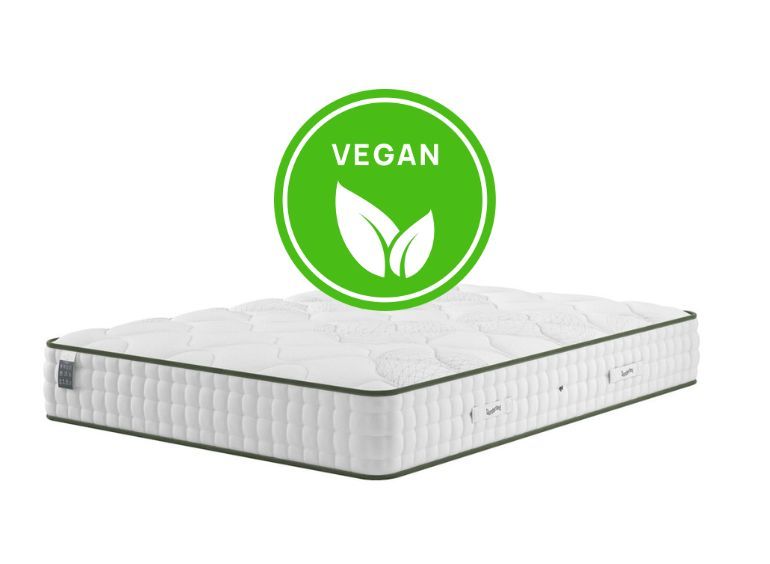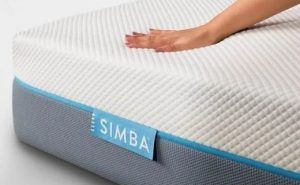Veganism can be defined as a lifestyle, which avoids the consumption and use of animal products. This means food derived from animals (meat, milk, butter, honey, etc.) are not eaten.
In addition to that, vegans do not wear or use products derived from animals, for example leather or wool clothes. Also, the products they use need to be manufactured in an way that excludes all forms of animal exploitation and cruelty.
Shopping for new products, especially mattresses can sometimes be confusing, because it’s not very clear if the materials used inside are vegan or not.
A vegan mattress is made from plant based materials, such as cotton, bamboo, and natural latex. Polyester fibers can be included inside and are considered vegan-friendly, because they don’t contain any animal by-products.
A vegan mattress shouldn’t contain any animal derived components, such as wool, mohair, cashmere, and/or silk. Memory foam mattresses can include polyurethane foams and synthetic foams inside, which are considered non-vegan. In addition to this, they may have chemical flame retardants, which may have been tested on animals.
So when shopping for a new vegan mattress, there are several things you need consider.
What Mattresses are Not Vegan?
If a mattress contains any of these materials it’s considered non vegan:
- Wool, mohair, cashmere, silk, and/or horsehair.
- Polyurethane foams and synthetic foams
- Synthetic latex
- Chemical flame retardants
- Soap may be used in the pocket spring manufacturing process
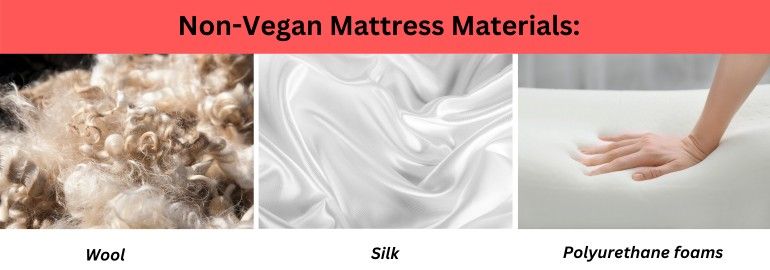
Is Memory Foam Vegan?
Many popular memory-foam mattresses are constructed with polyurethane foams and synthetic foams. These materials may be produced through specific chemical processes, which may involve animal testing.
What Mattresses are Vegan?
Mattresses that contain plant based materials such as cotton, bamboo, flax and natural latex, are considered vegan.
Natural latex is derived from the rubber tree plants and can be readily sourced in a sustainable manner.
Natural latex is a preferred mattress material because it’s naturally resistant to bacteria, mildew, fungi, and even fire. Organic cotton is derived from a plant, but because it is organic, it is chemical-free as well.
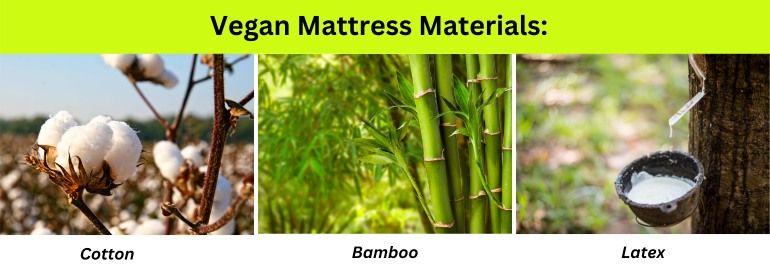
Mattresses that contain polyester fibres, and eco-friendly fibres made from recycled plastic can be classified as vegan-friendly. For example, the Silentnight Ferndale 800 Pocket Eco Mattress has a layer of Eco Comfort Fibres™ made from recyclable plastic bottles. This material is also naturally flame retardant, and hasn’t been treated with any chemicals.
Pocket springs are usually made from metal steel and can be considered vegan.
Look for mattresses that have been treated with natural and chemical free flame retardants, for example M-Pure treatment.
Best UK Vegan Mattress
The Slumberland Natural Solutions Mattress collection can be considered to be one of the top vegan mattresses in the UK.
It uses only vegan materials, which are plant based, such as: organic cotton, bamboo, and flax. They have been sourced from a local supplier in Cumbria. Plus, there are no animal products used in the manufacturing process.

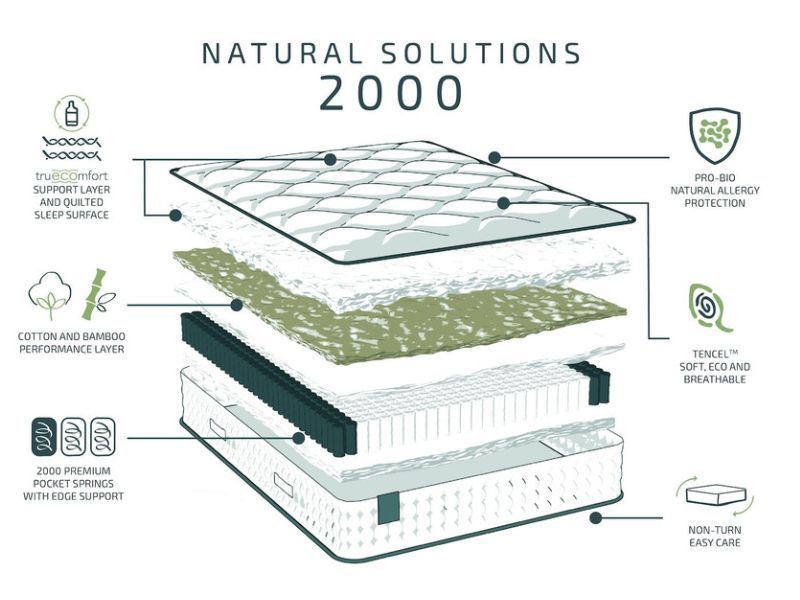
Inside there is a layer of 1,400-2,800 pocket springs made from recycled steel. They provided advanced body support and keep your spine in the correct alignment.
Slumberland has added a layer of TrueComfort, which are fibre made from recycled plastic. It makes the mattress more comfortable and supportive.
The mattresses has undergone Pro-Bio treatment, which is a natural and chemical free hypoallergenic treatment, against any bacteria, odors or dust mites. It comes with 8 year guarantee and it’s made in the UK.
How to dispose your old mattress in a sustainable way?
If you’re ready to trow away your old mattress, it’s important to consider what environmentally friendly options you have.
First, if your old mattress is in good condition and has its fire label attached, consider donating it. There are many UK local and national charities that accept old mattresses as donation. You can arrange a free pick-up and they’ll donate it to a family in need.
Another option is to have your old mattress recycled. Book a mattress recycling service from the retailer you’re buying your new mattress from. If you’re not buying a new mattress, find a specialty recycler in your area and have it picked up and recycled for a small fee.
Final Thoughts:
Finding a vegan mattress can be a difficult task, mainly because each brand manufactures their mattress in a different way and uses different materials inside. Try to avoid mattresses with memory foam, wool, silk, and cashmere inside. Instead, look for mattresses with plant based materials, such as: cotton, bamboo and latex.
Hopefully, this article has helped you determine not only how to identify a vegan mattress, but also where to begin your search for your next mattress. Just bear in mind that we spend 6-8 hours per day on our mattresses for years, so choose wisely!
